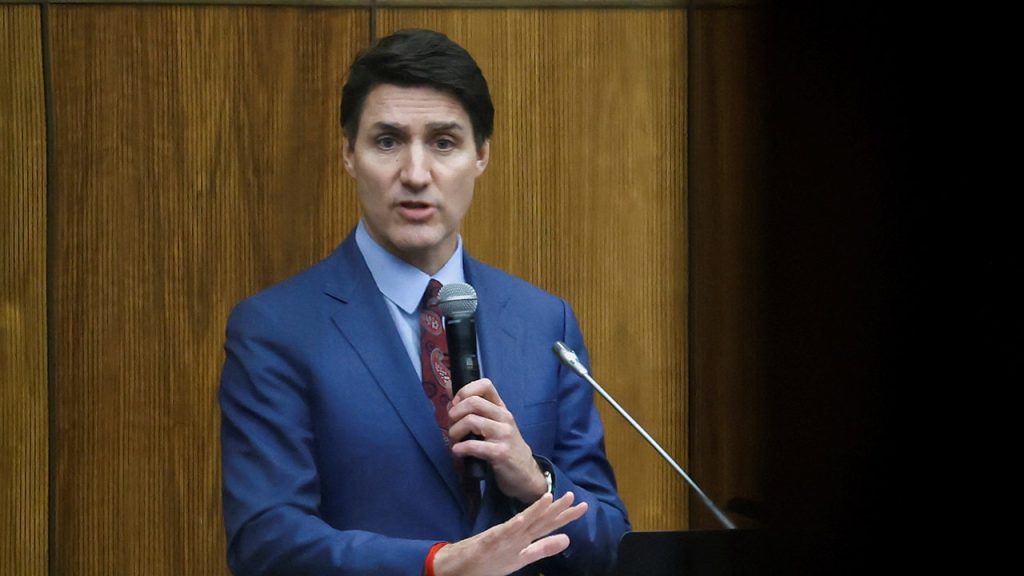The Impending Fall of Trudeau’s Government and the Triggering of Early Elections
Canadian Prime Minister Justin Trudeau’s nine-year reign is teetering on the brink of collapse, with a crucial ally, Jagmeet Singh, leader of the New Democratic Party (NDP), initiating a move to topple the minority Liberal government. Singh’s declaration of a formal no-confidence motion, scheduled for presentation upon the House of Commons’ return from its winter recess on January 27th, signals the potential end of Trudeau’s leadership and the onset of early elections. This move has been spurred by growing discontent with Trudeau’s leadership, compounded by the recent shock resignation of his finance minister, leaving the government vulnerable and facing mounting pressure.
Public Discontent and Opposition Unity: A Recipe for Political Upheaval
A confluence of factors has contributed to the erosion of public support for the Liberal government. Voter fatigue, coupled with widespread anger over soaring prices and a deepening housing crisis, has fueled a decline in the Liberals’ popularity. Recent polls consistently indicate a potential landslide victory for the right-of-center Conservative opposition should an election be called. The NDP, sharing a center-left voter base with the Liberals, accuses Trudeau of being overly influenced by big business, adding to the chorus of disapproval. This synchronized opposition, with the Bloc Quebecois also pledging support for the no-confidence motion and the Conservatives consistently advocating for an election, paints a bleak picture for Trudeau’s political survival.
The NDP’s Decisive Move and Trudeau’s Uncertain Future
Singh’s strategic maneuver throws Trudeau’s future into further uncertainty. With the Bloc Quebecois and the Conservatives expected to back the no-confidence motion, Trudeau’s chances of survival appear slim. The Prime Minister, already grappling with internal pressures, now faces an accelerated timeline for his political fate. His recent cabinet shuffle, undertaken amidst the unfolding crisis, seems to be a desperate attempt to stabilize his government, but whether it will be enough to stave off the impending no-confidence vote remains highly doubtful. Trudeau’s Christmas break, initially intended for reflection on his future, has now become a period of intense strategizing and damage control.
A Precarious Time for Transition and Economic Uncertainty
The timing of this political crisis couldn’t be more precarious. With the impending inauguration of U.S. President-elect Donald Trump and his proposed 25% tariff on Canadian imports looming large, Canada’s economic stability hangs in the balance. The premiers of Canada’s ten provinces, striving for a united front against the potential economic fallout from the tariffs, are increasingly concerned about the perceived chaos in Ottawa. The political instability at the federal level further complicates their efforts to navigate this challenging period and protect Canada’s economic interests.
Trudeau’s Options Dwindle as Pressure Mounts
Singh’s swift action severely limits Trudeau’s options. Even if he were to resign, the Liberals would struggle to elect a new permanent leader in time for the impending election, a situation unprecedented in Canadian history. This leaves the party facing the prospect of contesting the election with an interim leader, a significant disadvantage. While approximately twenty Liberal legislators have openly called for Trudeau’s resignation, his cabinet has remained loyal, adding another layer of complexity to the unfolding drama.
The Implications of a Potential Liberal Defeat
A Liberal defeat would mark a significant shift in Canadian politics. After more than nine years at the helm, Trudeau would be forced to relinquish power, ushering in a new era of governance under a different party. The potential victory of the Conservatives would signal a move towards the right, with implications for various policy areas, including economic management, social programs, and Canada’s international relations. The looming election promises to be a pivotal moment in Canadian history, shaping the country’s direction for years to come. The outcome will not only determine the future of the Liberal party but also the trajectory of Canada’s political landscape.










